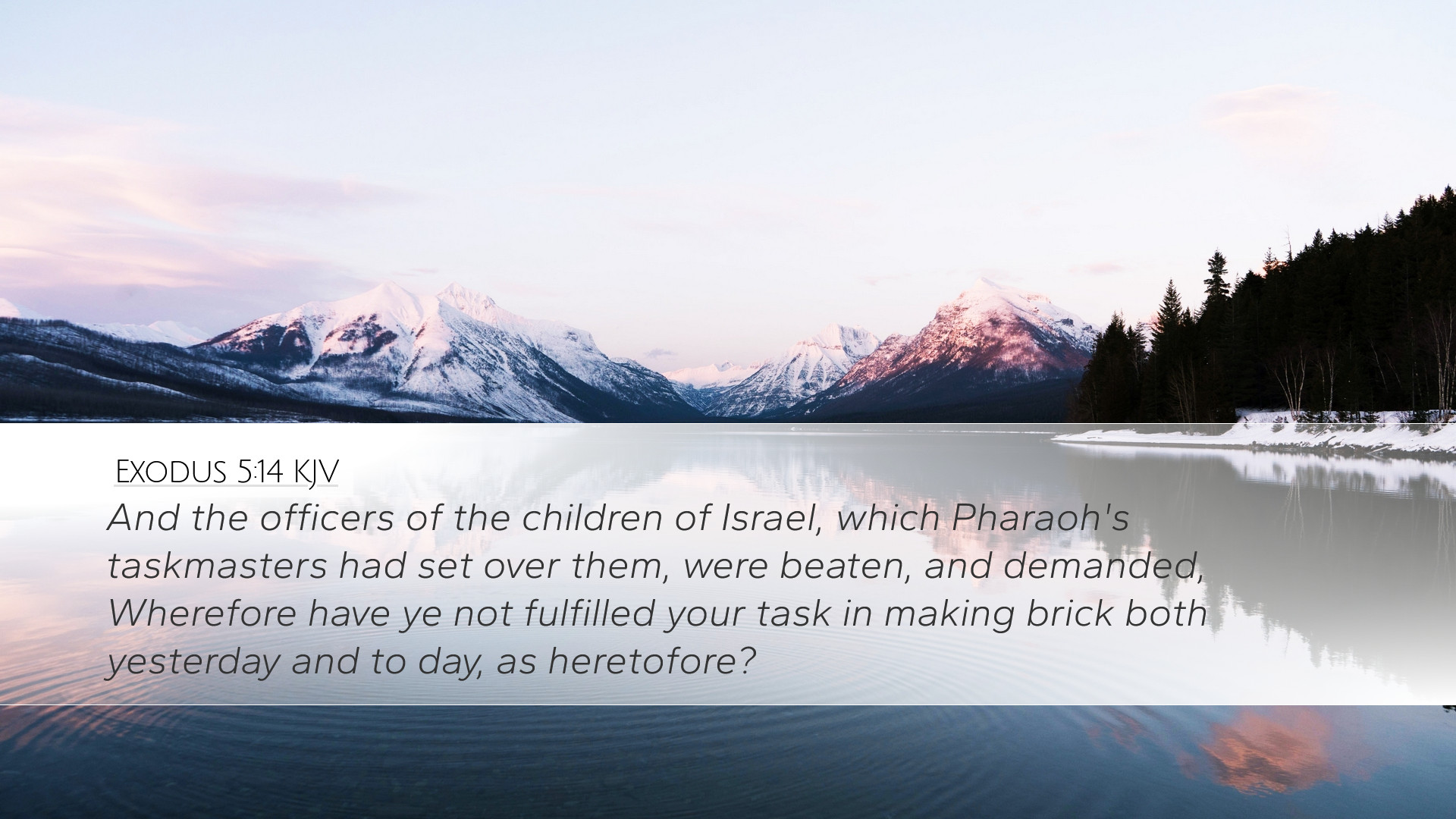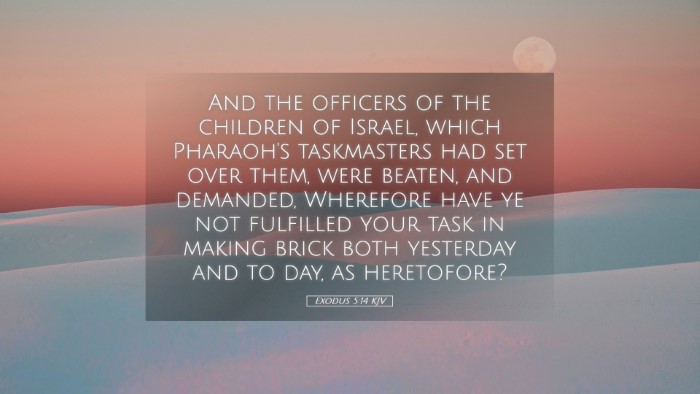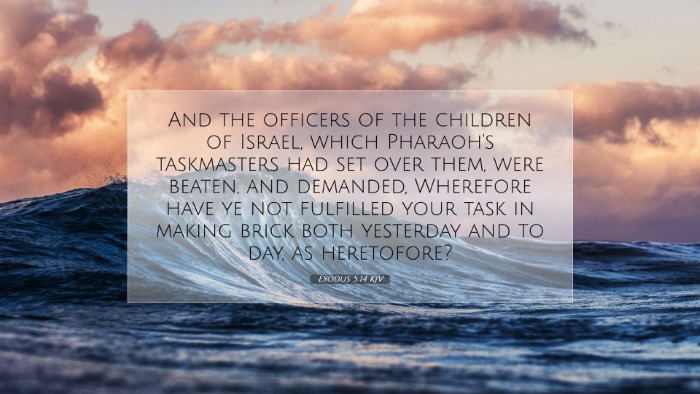Commentary on Exodus 5:14
Verse: Exodus 5:14 - "And the officers of the children of Israel, which Pharaoh's taskmasters had set over them, were beaten, and demanded, Wherefore have ye not fulfilled your task in making brick both yesterday and to day, as heretofore?"
Contextual Background
This verse occurs within the narrative concerning the oppression of the Israelites in Egypt. After Moses and Aaron confront Pharaoh with God’s demand for the Israelites' release, the resulting heavy-handed response from Pharaoh escalates the suffering of the Hebrew people. Understanding this context is crucial for interpreting the hardships endured by the Israelites and the divine plan at work.
Insights from Matthew Henry
Oppression and Accountability: Matthew Henry emphasizes the harsh conditions under which the Israelites labored. The taskmasters imposed strict quotas, leading to beatings for failure to meet these arbitrary demands. Henry notes that this reflects the cruelty inherent in human authority when it is unrestrained, serving as a lesson on the nature of oppressive regimes.
Divine Sovereignty: Despite the dire circumstances, Henry points out that God's sovereignty remains unchallenged. He suggests that the suffering of the Israelites is a part of a larger narrative where God is preparing to enact His deliverance. This foreshadowing emphasizes that God's plans often unfold in ways that may seem confusing or painful to His people.
Insights from Albert Barnes
The Role of Officers: Albert Barnes provides an analysis of the "officers of the children of Israel." These leaders were caught in a difficult position, acting as intermediaries between Pharaoh and the people. Barnes highlights the dual pressure they faced from both the Egyptians, who enforced harsh labor, and their own people, who looked to them for relief and leadership.
Injustice and Strain: The beatings described in this verse illustrate the brute force of Pharaoh’s tyranny. Barnes writes that this act serves to demonstrate the lengths to which oppressive authorities will go to maintain control, often punishing those who are merely carrying out their appointed duties. This not only serves as a historical account but warns against the dehumanization that can occur under such regimes.
Insights from Adam Clarke
The Nature of Suffering: Adam Clarke underscores the psychological aspect of the Israelites' suffering. He focuses on their despondency, suggesting that the physical beatings symbolize a deeper spiritual oppression. Clarke argues that such treatment serves to demoralize the people, causing them to question their hopes of liberation.
Expectation vs. Reality: Clarke notes the disparity between the Israelites' expectations (the hope for freedom proclaimed by Moses and Aaron) and their grim reality. This dissonance between promise and hardship highlights the challenges of faith, illustrating how the people's trust in God is tested under extreme circumstances.
Theological Implications
- The Problem of Evil: The suffering depicted in this passage raises questions about the problem of evil and the justice of God amidst oppression. It serves as an invitation for theological reflection on how God interacts with human suffering and injustice.
- Faith Amid Trials: The narrative encourages believers to maintain faith even when circumstances appear dire. The suffering of the Israelites ultimately leads to their deliverance, embodying the principle that God’s plans, while often inscrutable, work toward good for those who love Him.
- Human Responsibility: While God's sovereignty is dominant, Clarke and Henry both emphasize the role of human leaders and the responsibility they bear. This dynamic encourages a reflection on how leaders should act in oppressive situations, advocating for justice and compassion rather than compliance with injustice.
Pastoral Application
For pastors and leaders within the Church today, this passage serves as a powerful reminder of the call to advocate for justice in the face of oppression. Reflecting on the plight of the Israelites can inspire congregations to be sensitive toward the struggles of marginalized communities and to work actively to alleviate their suffering.
Moreover, the commentary encourages believers to uphold faith in God’s promises even when facing overwhelming challenges. The journey of the Israelites teaches that pain and suffering may be a part of the process, but these trials serve a higher purpose in the unfolding of divine deliverance.
Conclusion
Exodus 5:14 encapsulates a critical moment in Israel’s history that resonates with themes of oppression, justice, and divine sovereignty. Through the insights of Matthew Henry, Albert Barnes, and Adam Clarke, we see a rich tapestry of interpretation that speaks to the experiences of believers both in ancient times and today. As scholars and theologians examine this text, they are reminded of God's enduring faithfulness and the hope that sustains those who trust in Him, even in the depths of suffering.


